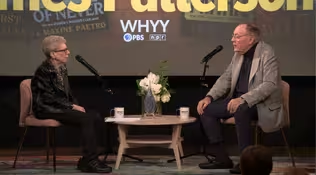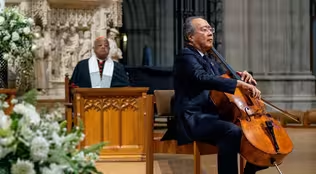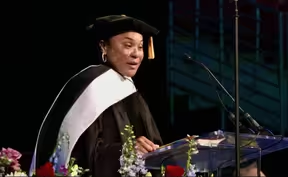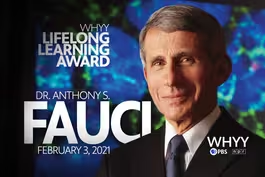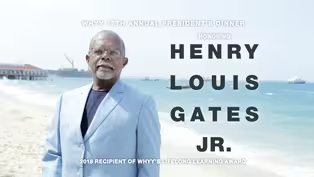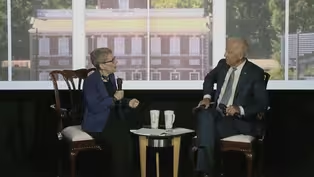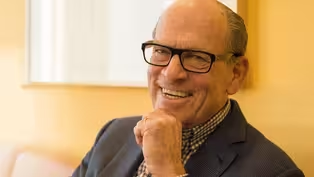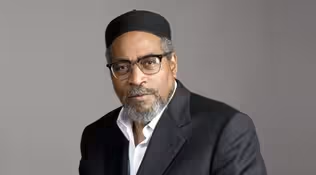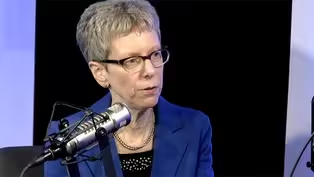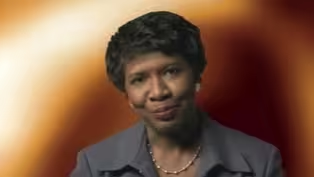
Lidia Bastianich: WHYY Lifelong Learning Award 2023
Special | 28m 45sVideo has Closed Captions
Chef, television host, and restaurateur, Lidia Bastianich accepts WHYY's 21st LLA.
WHYY honors Lidia Bastianich: chef, television host, author, and restaurateur, with the 21st Lifelong Learning Award. This special programming event features an interview between Bastianich and Terry Gross, host of Fresh Air.
Problems playing video? | Closed Captioning Feedback
Problems playing video? | Closed Captioning Feedback
WHYY Presents is a local public television program presented by WHYY

Lidia Bastianich: WHYY Lifelong Learning Award 2023
Special | 28m 45sVideo has Closed Captions
WHYY honors Lidia Bastianich: chef, television host, author, and restaurateur, with the 21st Lifelong Learning Award. This special programming event features an interview between Bastianich and Terry Gross, host of Fresh Air.
Problems playing video? | Closed Captioning Feedback
How to Watch WHYY Presents
WHYY Presents is available to stream on pbs.org and the free PBS App, available on iPhone, Apple TV, Android TV, Android smartphones, Amazon Fire TV, Amazon Fire Tablet, Roku, Samsung Smart TV, and Vizio.
More from This Collection
The WHYY Lifelong Learning Award recognizes an honoree who has demonstrated a passion for lifelong learning for themselves and for all those they can inspire. Previous recipients include President Joseph R. Biden, Dr. Anthony Fauci, Dr. Henry Louis Gates Jr., Gwen Ifill, Coach Dawn Staley, Lidia Bastianich and more.
James Patterson in Conversation with Terry Gross
Video has Closed Captions
Renowned author James Patterson accepts WHYY's 23rd Lifelong Learning Award. (27m 19s)
Yo-Yo Ma in Conversation with Terry Gross
Video has Closed Captions
Renowned cellist Yo-Yo Ma accepts WHYY's 22nd Lifelong Learning Award. (58m 45s)
Terry Gross in Conversation with Dawn Staley: Full Version
Honoring Olympic gold medalist, NCAA-winning coach & Basketball Hall of Famer Dawn Staley (1h 27m 4s)
Terry Gross in Conversation with Dawn Staley
Video has Closed Captions
WHYY 20th Lifelong Learning Award recipient Dawn Staley interviewed by Terry Gross (28m 45s)
WHYY’s Lifelong Learning Award honoring Dr. Anthony S. Fauci
Special virtual event honoring Dr. Fauci. (1h 6m 50s)
WHYY’s Lifelong Learning Award: Dr. Anthony S. Fauci VIP Q&A
Special virtual event honoring Dr. Fauci. (1h 35m 4s)
WHYY’s 17th Annual President’s Dinner
Video has Closed Captions
WHYY’s 17th Annual President’s Dinner featuring Dr. Henry Louis Gates Jr. (28m 47s)
Video has Closed Captions
The 2017 WHYY President's Dinner honoring Joseph R. Biden, Jr. (56m 46s)
WHYY's 15th Annual President's Dinner
Video has Closed Captions
WHYYs 15th Annual Presidents Dinner Honoring Joseph Neubauer (28m 47s)
WHYY's 2014 President's Dinner, Honoring Kenneth Gamble
Video has Closed Captions
Proceeds from this distinctive event support WHYY's extensive educational initiatives (27m 20s)
WHYY's 2013 President's Dinner, Honoring Terry Gross
Video has Closed Captions
WHYY turns the tables this year and honors Fresh Air host Terry Gross. (23m 13s)
WHYY's 2008 President's Dinner: Gwen Ifill
WHYY's 7th Annual Presidents Dinner Honoring Gwen Ifill (26m 42s)
Providing Support for PBS.org
Learn Moreabout PBS online sponsorship(upbeat music) - [Announcer] Please welcome tonight's host, Terry Gross, and tonight's honoree, Lidia Bastianich.
(audience applauding) - You grew up in Istria, which is a peninsula kind of parallel to Italy.
The northwestern tip is attached to Italy, and the northeastern tip is attached to Croatia.
And after World War II, in the treaty, your peninsula became part of Yugoslavia, 'cause Croatia then was part of Yugoslavia, which was communist.
So your lives completely changed.
And I wanna get to that in a minute, but before that, I wanna ask you about your grandmother's garden, which you write about on your website.
It's a kind of famous garden now.
And she raised like pigs and goats and rabbits.
- We did, yes.
- And had a big garden, and everything came from the garden and from from the animals.
She cooked over an open fire, and that's one of the ways you learned to cook.
Talk a little bit about the differences cooking over an open fire, and was it outdoors or indoors?
- It was indoors.
So they had two different approaches to open fire.
One was an actual open hearth with the (indistinct), they call the, you know, with the chimney that would go up.
She had a tripod.
Like a tripod, a metal tripod, of different sizes that you put over the coals.
And on the tripod, the pots would go.
Of course the paths would be all black by the time.
And they would stay like that.
It's not like you polished it every time.
The other way was to have it actually in the house, and you had the stove, it was a metal stove where you fed the pieces of wood into it.
And it has the rings, the iron rings that you would open or close or pull up and it had different ones.
They had an oven to bake, but it also served to warm up the house.
When she did big cooking, because, you know, we would also cook for the animals, for the pigs.
All the leftovers.
- You'd cook for them?
- Absolutely, you know, because the pigs have their structure.
They have a short digestive system, like us, more or less.
And so they're very sensitive.
- What would you make?
Like meatball and spaghetti?
I mean... (laughing) - I'll get to it.
So we recycled, you know, like you had a squash.
The seeds, the outside of the squash, fruits were overripe, the outside of cabbage leaves, and all of that, the potatoes.
All that got cut and put with water in there and then semola was added.
Semola was a bran, bran.
You know, after milling the wheat because she also had her wheat fields, and went to the mill to get the flour.
- Gee.
- So all of that, the polenta that was left over, so that was cooked.
And that was in a big pot.
Polenta also she cooked out there because polenta requires a cauldron kind of situation and that was on the open hearth.
- The year you were born in 1947, that was the year that the peninsula that you lived on switched hands from Italy to Yugoslavia, which was communist.
So your mother was pregnant with you at the time.
A lot of their friends fled Istria because they didn't wanna live in a communist country.
But because your mother was pregnant, your father said, you're not gonna give birth in a refugee camp.
So we're staying.
When you look back at that time and think about what a consequential decision your parents had to make while your mother was pregnant with you, what do you think about when you reflect on that?
- When I reflect on my life, I'm grateful.
I had a wonderful life.
I have a wonderful family.
So I cannot regret anything that happened.
Not being able to speak your native language, not being able to respect your religion and go to church and all of that, it would seem very oppressive.
And it is, it is.
But in retrospect, we came here, we were given that chance.
And I guess that's... - Well, things worked out, that's for sure.
But I just imagine what it must have been, what it must have been like for your parents to decide whether to flee or stay while you were in utero, you know?
- Right.
Well, maybe I'll just describe a little bit the actual situation.
So Istria is a little peninsula that is across from Venice, and it is on the other side, you have Dalmatia now.
And that area certainly was under Italy, Romans, the Venetians, and so on the forth.
But that area was also as under the Austria-Hungarian.
So it was a border area that would go back and forth.
World War II, of course, I think ended in '44, but there was, the Allied Forces were there to end it, and the British, to hold peace, unlike today's situation, war situation where different countries try to hold peace and negotiate peace.
So that was in '47, as you said.
I was born February 21st, 1947.
The peace treaty was the treaty that actually delineated the border.
It was February 27th, 1947.
So a few days after me.
That whole area, in those years, from '44 to '47, it was the big exodus.
I think about 300,000 people just left.
They left with the belongings they had, moved on, went back to Italy and moved on into the world.
Once the Iron Curtain went down, you were locked.
They began to change the names.
You couldn't speak the language.
- You had to speak Croatian.
- Yeah, but you see, again, when you live in a border situation, you speak because of all those different occupations.
I mean, we spoke at home Italian, but Croatian and Yugoslavian is very similar.
Even even a little German, you know, the Austria-Hungarians.
So you speak several languages.
So we had to, yes.
My mother was a teacher and she really had to hone her Yugoslavian because they insisted of course that she teaches in Yugoslavian.
And of course changed her whole idea, her whole dogma of thinking, you know.
- Did the food change?
- The food changed because there wasn't enough of it.
- There wasn't any.
- There wasn't enough.
That's where my grandmother and all the animals.
And she supplied, she lived in a little town outside of Pola.
Pola is the big town that's now called Pula where we lived.
So my parents put my brother and myself with grandma so we would be freer there, not in the city where actually you had, you know, it was called the Udba, the police, minding and watching everybody.
Food was scarce.
It was rationed.
You can only buy certain things.
Only certain things at certain times were available.
But they really, the family needed food.
And that's where, and the chickens and all of that came.
The chickens, we had chickens, we had goat, we had rabbits, we had goose.
We had two pigs every year.
Had enough olives to make olive oil, enough grapes to make wine for the family.
A little wheat field to make flour for the whole family, my aunts and my cousins and whatever.
And I was raised in that setting.
I think that my passion and understanding of food really was set in me at that period of learning as a child of really assimilating things, you know.
- Your father-- - I could go on and on, but I'll... - Your father was arrested when you were a child, when you were still living on the peninsula.
And you went to visit him with your mother when you were, I think eight years old.
That must have been terrifying to be in a prison and see your father in it.
Can you describe what you witnessed and the impact that it had on you?
- I remember that vividly, the fright that I felt.
So my father was, he was a mechanic, but he had two trucks.
So he was a little businessman.
And he was considered by the communists coming in as a capitalist.
They took away the trucks and they incarcerated him because he was a capitalist.
And, of course, as children, we wanted to see him.
I remember just being so insecure, so frightened.
So, you know, this, everything seems so big when you're a child.
You know, you enter into these big offices, everybody in uniform speaking this harsh language that somewhat I understood, but it wasn't my language.
And so I remember the sentiments very well.
Still now, still today.
- Did it leave a mark on you of fear?
- I, yeah, absolutely.
You know, you are a product of your experiences and what, but I think that you come to terms with it at some point of your life when you understand.
And certainly if everything ends well.
We did come all together here.
And I think in my case, and, you know, you can within yourself make those negative sentiments positive.
Make you stronger.
- Resilient.
- Resilient, and may be able to to sort of extend the positive of what you experience to whomever needs it at the time.
- You eventually left.
You were 10, I think.
- Yes.
- When you left the peninsula under false premises.
Your mother and her sister, your aunt, and your sister was living in Italy, in Trieste.
They concocted this plan where they would say that your aunt was terminally ill and that your mother and your aunt wanted to see each other and say their goodbyes with your mother's children, with you and your brother, one last time.
And so you got across and the plan was your father would walk across and sneak across later, which he managed to do after nearly getting killed.
When he finally crossed the border with secret police shooting at him and living in the woods and climbing over barbed wire fences and so on, what kind of shape was he in?
- The question was that they did not allow the whole family to go even though the border went down, whoever was on that side, and we had some relatives, the aunt that was on the other side, and they remained in Italy.
But they wouldn't allow the whole family to leave.
Somebody had to remain as a hostage because then they knew that the family would return.
In our case, my parents had planned otherwise.
And he said, I'm gonna give it a shot.
So he was accompanied up to the border, he told us, and not up to the border, but he said, cross that mountain, go over there and there you can go through.
And he did after they shot at him, whatever.
But I remember he, it was one o'clock at night and the door banging and my mother crying, my aunt crying, everybody.
So us kids jumped up because we weren't aware that we are not going back home.
You don't tell a kid that, you know, we spill the beans.
And so when we jumped up, my father actually was collapsed in front of the door and he was all muddy, covered in mud.
And, you know, then was this big emotional, what is he doing here?
What happened?
You know, what condition?
Is he gonna be alive or whatever?
That was the reunion.
- And then you ended up moving to a refugee camp, which was, actually, it was called San Sabba.
- San Sabba, yes.
- San Sabba, and it was basically a former concentration camp during World War II.
There's a picture of it in your memoir.
It doesn't look good.
- No, it's-- - No, describe what the atmosphere was like there.
I think you didn't know at the time that it had been a concentration camp, but there was a crematorium there too.
There were the ovens.
What was the feeling?
Did it feel haunted even though you didn't know what had gone on there?
- Yes, there was a feeling of darkness.
There was a smell.
- What was the smell?
- It was musty, mud because also the courtyards, you know, it was enclosed.
Everything was enclosed.
It had this big gate and you couldn't pass.
Now, just to explain how we got there.
When we came and my father met us, we didn't have the papers.
We didn't have complete papers.
So had we remained in Italy, we could have asked for Italian refuge, but my parents decided even Italy was in conditions after the war.
Let's try and go on to America or Canada, whatever.
So we were there without papers.
The Yugoslavs had secret police in Trieste.
- Oh.
- So, and they kind of would spot people that escaped, you know, because they kind of looked lost, and they would repatriate them.
You know, they would bring them to the guards and say, listen to the police.
They don't have any papers.
These need to go back.
So we, my parents immediately decided to go to the police and ask for asylum.
And at that point, if you asked for asylum, you are an immigrant without papers and they put us in the camp.
And then there it's controlled.
You can't leave, you can't go out.
You have to stay within those boundaries.
And it was closed.
- You had a lot of trauma as a child, whether you recognized it as trauma or not.
And I'm wondering what the relationship in your life has been between food and trauma.
'Cause one way of trying to soothe yourself when you're suffering through a trauma or reliving the trauma is to eat or to eat comfort foods, foods that you love.
Of course, at the time, food wasn't plentiful for you.
It was scarce.
So what do you think in the long term like your relationship between food and trauma has been?
- Definitely my path has led me to where I am today.
Growing up to see food grow.
I remember going after my grandmother to pick the potatoes.
And the potato is a bush plant with roots, and the potatoes are tubers that latch onto the roots.
So she would plow around and pick up the plant and the big potatoes she would put in her little basket and I was behind her collecting the little potatoes.
And they were the better anyway.
But I still feel it today.
Put that potato in your hand and it's warm and this is what the earth gives you.
It's this connection that, you know, really made me and my relation and understanding of food.
And from then on, all the other things, you know, whether it would be the cabbage, helping her do that.
Maybe harvest the fruit, to dry the fruits for the next year.
The figs, put them on fig leaves in the sun so that they would dry so we would have them all year round.
But what food meant to me was when we were in Trieste in Italy in the camp, and I did not know that we were not gonna go back to grandma.
And so that feeling of unfinished work, I hadn't said goodbye to my grandmother, to my friends, to my goats and all because I used to milk the goats and we had every morning milk goat, and we make ricotta from the milk goat.
So those are all experience that I had.
But when I realized that I wasn't going back, food became my connector.
Cooking, and when my aunt would cook, the food, the smells, it brought me back to my grandmother, to that place.
And I realized that I could do that to satisfy myself.
And then I realized that, you know, I was pretty good at it.
And then I realized that I could nurture and feed other people.
And I love that, just like my grandmother did.
And so on my life became exactly that, a life of cooking and nurturing from family to people.
And ultimately the opportunity of turning it all into a business.
- You grew up without a refrigerator, right?
- In grandma's, yeah, sure.
In Europe, yes.
- Yeah.
When did you get your first refrigerator?
- Oh, once we came to the States here.
And we ultimately had the apartment and wherever, it came, the refrigerator came.
It was also, I remember was we were amazed.
Oh, you get the refrigerator, get the stove with it.
- How did it change your life to have a refrigerator?
- I remember we used to put the butter, we didn't use much butter, in just plain water.
In cantina, in the cellar, you used to, where it was cool, store things.
And you just went every morning to buy something or every morning to the garden to get something.
And you cooked what of the day.
And then if you made a soup, a big pot, it lasted two days.
I remember always though, grandma always said make sure you reboil it before you eat it, you know.
And then when you reboil it, if it starts to foam, it's time to throw it out.
So just in case.
- Yeah.
(audience laughing) - So you worked for a while at a bakery called Walken's Bakery, which is Christopher Walken's parents Bakery.
Did you meet Christopher Walken?
- We worked together.
- You worked together?
- We're still friends.
- Oh, no, really?
What was he like as a kid?
- There were three brothers.
There's Glenn, Christopher, and Ken.
He was three or four years older than I am.
And, you know, the father was a German immigrant.
The mother was Scottish, but I think she was born here.
And the kids worked.
He put them to work.
They were going to school.
I know he was going because it was strange to me, you know, that he was going to dancing school.
And to me, you know... - Oh, he's a good dancer.
- He is.
- He is.
- Yeah, he was going to that, and, you know, this, the mother was into putting them in the film industry and the performing industry.
And ultimately, you know, on weekends they would come, they would help, They would deliver the wedding cakes to the different halls, you know.
So they did their job.
And we were friends.
And then they had also a summer home out in Long Island.
And when they closed for vacation, I would go there to be kind of a house helper.
I would also play a little bit with the boys.
They had a boat and so on.
So we developed a very nice relationship.
As a matter of fact, we are still friends.
- You met your future husband at your own sweet 16.
- Yes.
- And he was also, he was from the same peninsula, right?
- He was.
He was from the other side of the peninsula, yes.
- Yeah, and you got married like midway through college.
- Yes.
- And you left college because you also got pregnant soon after you were married.
Of course your mother was very upset.
She wanted you to finish college.
- She was very upset.
- Yeah And your son, when he was 18 months old, he was diagnosed with a kind of blood bone disease.
- Perthes.
Perthes' disease is a bone disease.
And it is in developing infants in the hip joint, the round part doesn't get enough nourishment.
And if they walk, they consume it and ultimately club food sit in.
- So he had to stop walking for a year.
So just when children are really like learning to walk, he couldn't walk.
He was in a, not a cast.
- A brace.
- A brace for-- - He had a brace.
- Like 18 months.
- Yeah, I had to keep his legs so that the bone would get the nourishment.
- And this is about the same time that you and your husband are starting your first restaurant, right?
- Yeah, just after.
We were planning, but just after that, yes, we opened our first restaurant.
- What was it like for you as a mother of a son who needed a lot of attention, I'm sure you were very worried about him, to also be having this new undertaking with your husband?
And you were needed at the restaurant and you were needed at home.
I mean, so many mothers go through having to divide their time.
This was a time when a lot of women didn't work.
I think it was really hard for you.
But tell us about what-- - Well, it's hard for a mother to hear that a child, no matter, you know, what the illness is.
So the fact of assessing that and understanding, and understanding that it eventually could be cured, that sort of alleviates you because you are part of the solution.
So keeping him in a brace with metal bars in front of it, and it had this, what is this thing that sticks so that you can stick it, they use it on everything?
- Velcro?
- Velcro.
So they were with Velcro.
So of course this young kid, he was, what was he?
He was two, two and a half.
Zoom, zoom, he would pull up and he would start running.
And I would run after him, put him back in into these braces.
It was a tough time.
But again, I consider myself blessed in the sense that I had my mother and my father.
We lived together in a sense.
My first few years, a few, year or something of marriage, of course you need your independence.
But as soon as Joe came, they moved in downstairs and, you know, the typical setting of a mother and daughter.
- So that's who they help raise your son.
- Yes, yeah, they were there.
I couldn't have done what I did without the support, certainly, of my family, of my mother, of everybody around.
But I do often get, and I wanna make this point, the question, Lidia, how did you do it as a woman, you know, go out there?
And, you know, the question is, oh, am I guilty?
Am I doing the right thing?
Am I not?
Should I?
So not too long after we opened, we opened in '71, '72, I had my daughter, my daughter.
So we were one year into the business.
We had a loan.
We, you know, we put all the money that we had into getting, opening this restaurant.
And I was committed.
Now, I was not a chef at that time.
You know, I loved to cook.
I did some cooking, but I was not.
We hired a chef.
- You were the hostess a first, right?
- Well, it was between.
My husband was the host.
He was the front of the house, as they call it.
And so we hired a chef and I went in as his sous chef.
For 10 years I was in with the chef that we hired.
When I first had my daughter, of course, I took two or three months off.
And there was time that really I needed to go back.
And I was kind of questioning myself.
So I went to the pediatrician, you know.
We had no psychiatrist at that time.
At least, at least we didn't go to psychiatrists.
I told him, I dunno what to do.
I have this child.
I'm the mother, I'm responsible.
I wanna be with her.
And he was very wise.
He said, Lidia, children are happy within the family.
They understand.
Children come into a family.
You don't change the family because children come into it, which happens a lot of times.
So I said, okay, our priorities were we had to work to feed and whatever.
He said children want happy parents.
I said, okay, I can live with that.
And so it happened.
I managed with my mother.
I gave my kids the best time.
I included them as much as I could in what I was doing, I was bringing them to the restaurant as much.
They had the dinner.
I did just that.
- What was on your first menu in your first restaurant?
- Oh, it was all Italian American.
Because, you know, in '71, all the famous restaurants were Italian American and certainly the chef that we hired was Italian American.
And then once I went into the kitchen, then I began to kind of modify and add, add polenta, add the risotto.
And that's where sort of I made my space.
- But you started off with the large meatballs?
- Absolutely.
(audience laughing) The larger, the better.
But you know, there's a story why the large meatballs.
You know, after, because I was curious, I said, you know, what happened to the Italian cuisine when it came here?
How did it?
And what happened was that, well, the first influx of Italian immigrants were from Calabria, Sicily, and Campania, which is Naples.
So the Italian American cuisine really reflects the flavors of those three regions.
And when they came here, they had, of course, they remembered what they cooked, but they didn't have the product.
How do you transport a culinary culture of one to another is with the products.
It's the straightforward, simplest way.
Because if I give you a slice of prosciutto and a piece of parmigiano, you know you're in Italy.
And the other way is technique.
So, you know, they used the technique because they didn't have a lot of the products.
But they came to America and there was meat available.
And they used the meat.
I mean, the Sunday sauce here in America is quite different than the Sunday sauce you would have in Italy.
In Italy it's a small piece of meat, some (indistinct) skin, and it's not cooked three, four hours.
Here you have meatballs, you have sausages, you have braciole.
And that's all because, you know, they came and they could now eat meat.
This showed that they lived well.
And so the meat, the big meatballs have a reason.
- Yeah, even though you were a very experienced cook by the time you, say, opened Felidia in Manhattan, which was your first like famous restaurant, classy, more expensive food, more fine dining.
And so you were the chef, and you were the owner with your husband so you had plenty of authority.
There were very few women chefs at the time.
Did people respect your authority?
Or did you feel like you had to earn it, even though it should have just been a given?
Like what did you have to do to get the respect that a male chef would have automatically gotten?
- Well, I think first of all, what I feel, and again, I tell women when they ask me, is that you have to empower yourself.
You have to.
I don't, I never looked at myself as my profession in the gender sense.
I'm a chef.
Am I a good enough chef?
Do I make the best of me?
Do I train myself?
Do I take the time to learn?
Do I give the best that I can?
That's what makes a chef.
And I think if you deliver quality, you can overcome all of the other.
But I know that in my time when, when we opened in '81, most of the big chefs were French chefs and with toques and all that.
I never wore a toque.
I felt like a conduit of my native country to my adopted county.
So I was true to form till this day.
I'm not an inventive chef.
I am true to form to what the Italian tradition has and wanna bring it here.
Although traditions evolve too, so they change.
So going back and all of that, I learn.
So being a chef, you know, I was giving good food, honest food, presented with an elegance evermore because those are the things that one can add without really changing the food, if you don't turn it into a foam.
(audience laughing) - That's right.
I wanna thank you so much for being here this evening.
I wanna thank you for your recipes, for your TV show, and also just for your strength.
Thank you so much.
- Thank you.
(audience applauding) (upbeat music) - It's my pleasure, on behalf of the board and the staff of WHYY, to present you with this year's WHYY Lifelong Learning Award, which Bill will present.
- Thank you, thank you very much.
(audience applauding)
Support for PBS provided by:
WHYY Presents is a local public television program presented by WHYY
